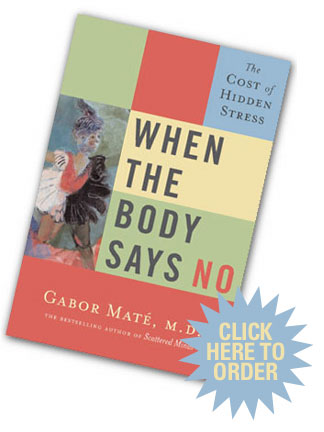| 
Can
a person literally die of loneliness? Is there a connection
between the ability to express emotions and Alzheimer's
disease? Is there such a thing as a "cancer personality"?
Questions such as these have long surrounded an often
controversial debate regarding the connection between
the mind and the body in illness and health. As ongoing
research is revealing, repressed emotions can frequently
lead to stress—which, in turn, can lead to disease.
Provocative and beautifully written, When the Body
Says No provides the answers to these and other important
questions about the effects of stress on health. In clear,
easy-to-follow language, Dr. Gabor Maté lucidly
summarizes the latest scientific findings about the role
that stress and individual emotional makeup play in an
array of diseases, including heart disease, diabetes,
irritable bowel syndrome, multiple sclerosis, arthritis,
cancer, and ALS, among others.
Offering profound insights into the link between emotions
and disease, When the Body Says No explores the
highly debated effects of stress on health—particularly
of the hidden stresses we all generate from our early
programming. Dr. Gabor Maté explains how, when
the mindbody connection is not optimal, various illnesses
can crop up—everything from heart disease and eczema
to irritable bowel syndrome and ALS. He presents the scientific
evidence that a connection exists between the mind and
the immune system—along with illuminating case studies
from his years as a family practitioner that reveal how
one’s psychological state before the onset of disease
may influence its course and final outcome.
As Dr. Maté wrote in The Globe and Mail: “When
we have been prevented from learning how to say no, our
bodies may end up saying it for us.” When emotions
are repressed, this inhibition disarms the body’s
defenses against illness. And, in some people, these defenses
go awry, destroying the body rather than protecting it.
Despite a rapidly accumulating body of evidence attesting
to the mind-body unity, most physicians continue to treat
physical symptoms rather than persons. When The Body
Says No argues persuasively that we must begin to
understand the mindbody link in order to learn more about
ourselves and take as active a role as possible in our
overall health.
Dr. Maté explains how the dynamics of self-repression
operate in all of us. With the help of dozens of moving
and enlightening case studies and vignettes drawn from
his two decades as a family practitioner, he provides
poignant insights into how disease is often the body's
way of saying "no" to what the mind cannot or
will not acknowledge.
Above all, When the Body Says No promotes learning
and healing and helps improve physical and emotional self-awareness—which,
Dr. Maté asserts, is at the root of much of the
stress that chronically debilitates health and prepares
the ground for disease.
|
Vancouver
doctor Gabor Maté, who falls into a long tradition
of doctors/writers, has a new book about illness-producing
stress. When The Body Says No is full of startling
insights and hard won poetry.
-Judy
Stoffman, Toronto Star, March 20, 2003 |
|
Home
| Dr. Gabor Maté | About
the Book | Read the Book | Dr. Maté's Articles
Book Reviews | Press
Clips
| Reader's Reviews | Audio/Video | Ordering
Info
| Email
jeremedia©
2005
|
| "I
was deeply drawn into this compelling and meticulously researched
book, particularly by the transcribed interviews in which patients
are allowed to speak in their own voices... Full of complex and
powerful truths, When The Body Says No has the potential
to change medical thinking, and perhaps even save lives."
-The
Edmonton Journal |
|
"The
interviewees' stories are often touching and haunting... Maté
carefully explains the biological mechanisms that are activated
when stress and trauma exert a powerful influence on the body,
and he backs up his claims with compelling evidence from the
field... Both the lay and specialist reader will be grateful
for the final chapter, "The Seven A's of Healing,"
in which Maté presents an open formula for healing and
the prevention of illness from hidden stress."
-Quill
& Quire |
|



